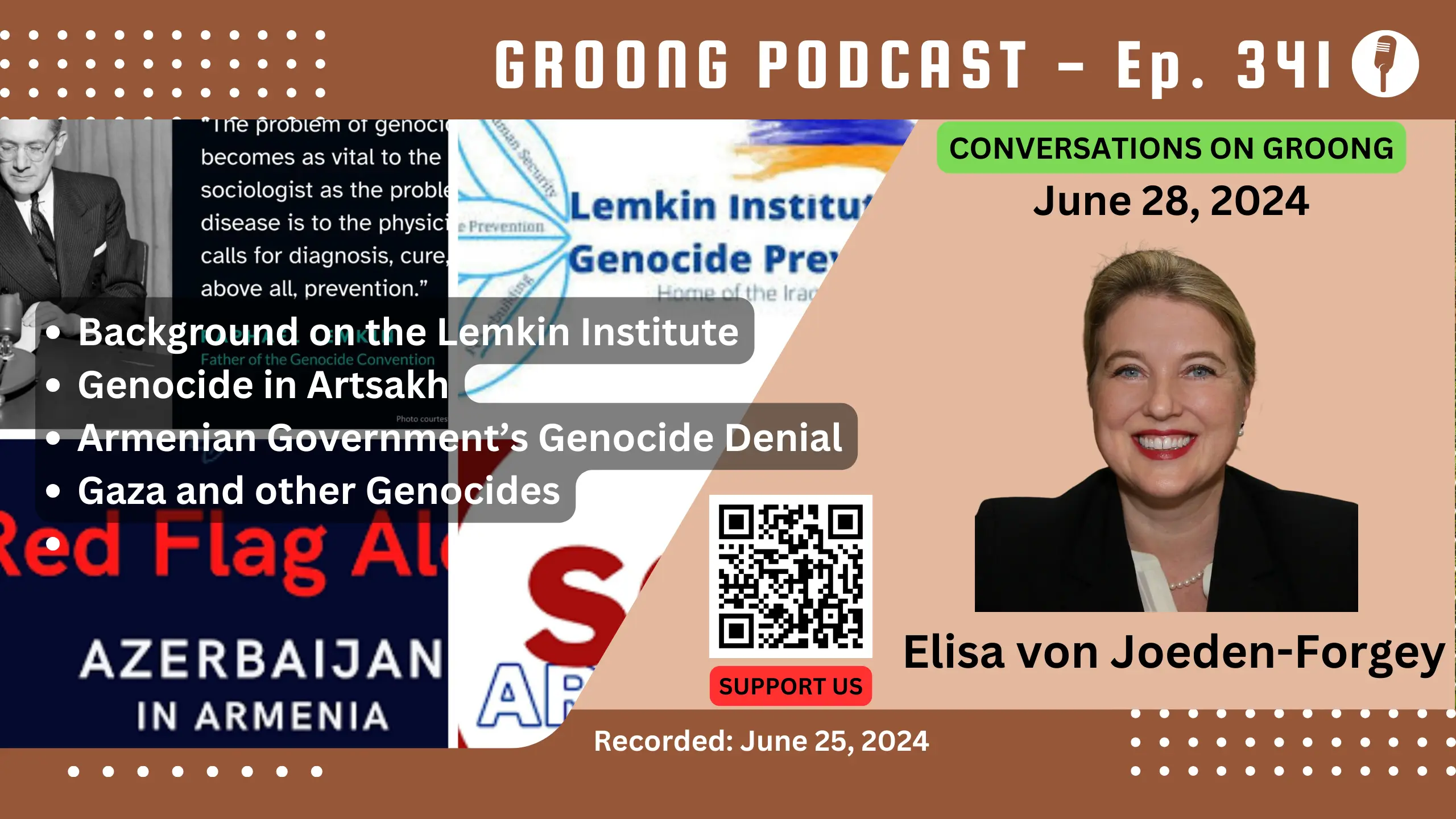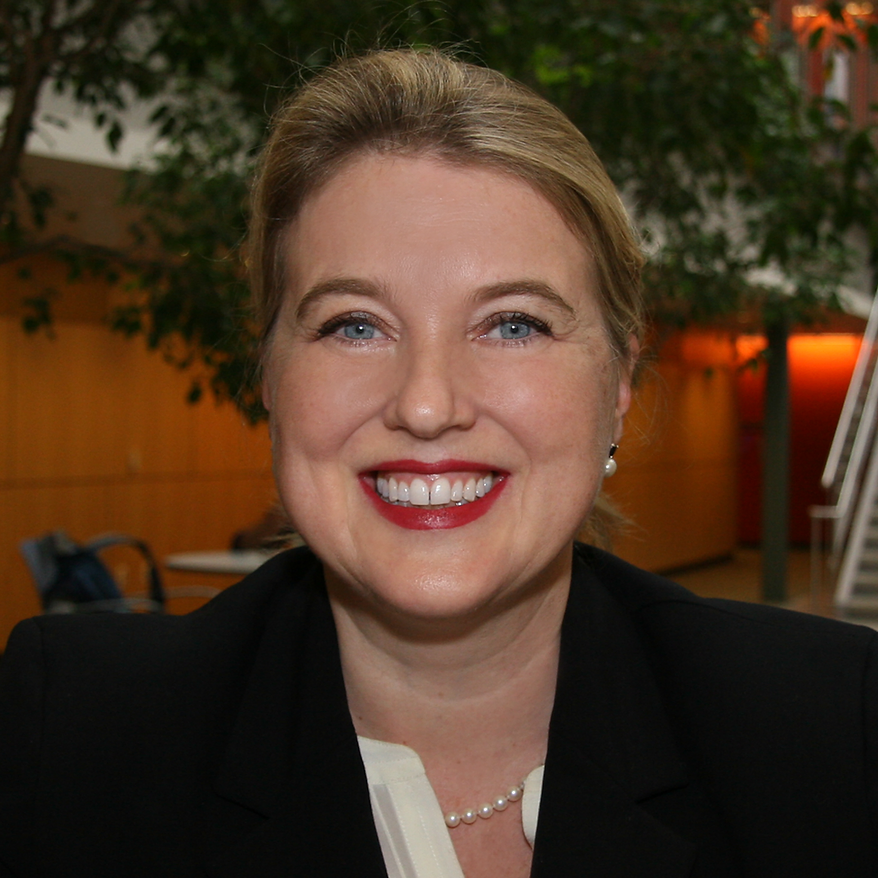
Groong Links:
Guest:
Topics:
- Background on the Lemkin Institute
- Genocide in Artsakh
- Armenian Government’s Genocide Denial
- Gaza and other Genocides
Episode 341 | Recorded: June 25, 2024
Show Notes
Background on Lemkin Institute
Your institute is relatively new, and this is your first time on our show.
Questions:
- Would you tell us a little about yourself, and also about the Lemkin Institute and its founding?
- What is the current mission of the institute?
- What is the process through which the Institute determines, and then declares a situation as a genocide?
- How is the Lemkin Institute funded? What are the resources at the institute?
On your website we see that the Lemkin Institute keeps a wide watch of genocide around the globe, and that it also takes an uncompromising, un-political stance on the issue no matter where it takes place.
Questions:
- In today’s world, this level of independence is commendable and rare unfortunately. What’s the key to success here?
- How can people be more involved with the institute?
Artsakh Genocide
How did we get here?
Your organization has been outspoken in support of the right of Artsakhtsis to live on their own historic land. The very first “Red Flag Alert’’ you raised, back in 2021, was about Artsakh. And those red flag alerts were issued regularly until September, 2023, when after a short but deadly war, Artsakh was forcefully depopulated of all of its indigenous people. The harrowing scenes of the slow procession of cars and people through the Lachin corridor to Armenia was reminiscent of the photographs of forced marches in 1915.
Your Red Flag Alerts were prophetic and unfortunately the global powers today seem ready to accept what happened, at least for now.
Questions:
- How did we get here? What can be learned from Artsakh in order to prevent future genocide?
- In the past you have said that what happened in Artsakh was genocide. How strong is the scientific record that what happened in Artsakh was a genocide?
- In today’s geopolitical climate, what is realistic and what isn’t? What can be done to preserve the rights of Artsakhtsis to their historic lands.
See no evil?
Shortly before September 2023, the US government seemed to have an uncompromising stance on the threat of violence in Artsakh. The words of Yuri Kim before the ethnic cleansing were encouraging but her silence afterwards were deafening.
Let’s assume some “international community” actually exists.
Questions:
- Was there any international role that key players failed in or conveniently chose to ignore?
- Note I deliberately omitted the word “duty”.
- NOTE: In previous interviews, she has said that “The world could stop genocide if it wanted to” and that “outside actors are so important for setting the state for genocide”.
After the ethnic cleansing of Artsakh, James O’Brien, said that the US is putting together a “comprehensive, thorough and transparent” record of what transpired. That was back in November of last year, more than 6 months ago.
Then, we saw Azerbaijan sign more contracts with the EU and welcomed a more prominent role for Azerbaijan, the latest example of which could be seen in how they’re accepting the news that Azerbaijan will host COP29.
Less than two weeks ago, O’Brien was in Armenia and indicated that the report that they’ve commissioned is still being worked on. And until this report is released, they don’t know if what happened is ethnic cleansing or “immigration”.
Questions:
- Is it really so difficult to uncover what happened?
Armenian Government’s Genocide Denial
Pashinyan’s Language of Denial
This year on April 24, Pashinyan during his address on the occasion of the Armenian Genocide, issued a statement that came under criticism from the Lemkin institute.
One of the key eye-catching aspects of that statement was that he used the term “Meds Yeghern” frequently. In the first paragraph of the statement, he mentions the term Armenian Genocide; but also in parenthesis, he mentions “Meds Yeghern” as a way of introducing a new term. And then he proceeds to exclusively use the latter term.
Meds Yeghern has been used by Pashinyan recently. It is a statement from the days of the Obama administration, when diplomats were trying to identify a euphemism to use for the Armenian Genocide without actually using the word “genocide”.
On May 10, the Lemkin Institute issued a statement titled: “Statement Condemning Prime Minister Nikol Pashinyan’s Cryptic Engagement with Genocide Denial”.
Questions:
- Why did you decide to issue your statement?
- Was your statement based on different standards than with other genocides?
- What is the issue with using the term “Meds Yeghern” instead of explicitly using the term Genocide, for The Armenian Genocide?
- What has been the response to your statement from the Armenian government and its associated circles?
- Previously you had been featured as a guest on Armenian Public TV. Have they called you to get comments on this statement or invite you on their program for another interview?
- Has anyone else from the Armenian government or allied with them tried to reach out to your org?
Greg Sarkissian Criticism of the Lemkin Institute
Greg Sarkissian, head of the Zoryan Institute, has criticized your statement, calling for an apology to Nikol Pashinyan and the “Armenian people”. His article was published on the Zoryan institute website, but in it Sarkissian clarifies that it is his own personal opinion and not that of the institute.
It is unclear which “Armenian people” he’s talking about, certainly it can be argued that a significant number of Armenian people, especially diasporans, are incensed at Pashinyan’s own statements and the statements coming from his “lieutenants” that belittle the veracity of the Armenian Genocide. Nevertheless, the main argument in Sarkissian’s article is that you omitted the first paragraph from Pashinyan’s April 24 statement, which as we mentioned before uses the term “Armenian Genocide” once, but then continues to emphasize “Meds Yeghern”.
Sarkissian’s article mentions nothing about Pashinyan’s coterie of yes men who have made more questionable statements. For example:
- Hovik Aghazaryan, MP from Civil Contract, repeatedly has questioned Armenia’s legal basis for pursuing justice.
- Andranik Kocharyan, another prominent MP from Civil Contract, has said that Armenia must have an exact count of genocide victims (including names and addresses) and if we don’t, then this gives basis to debate the veracity of questioning the number of Genocide victims.
Questions:
- How would you respond to Sarkissian’s criticism?
Gaza and Other Genocides
Today, we talked about mostly cases of Armenian interest, such as the Armenian Genocide and the genocide in Artsakh. But the manifestation of genocide worldwide is undeniable.
Questions:
- Can you tell us what other areas of the world are you raising red flags about?
- We have some obvious cases such as Gaza, at what point did Gaza turn from a “response” to October 7, to a humanitarian crisis, and now on to a Genocide?
- Where else is genocide occuring or there’s a rising risk of genocide?
References
- Lemkin Institute Calls on UN to Withdraw Azerbaijan as Climate Summit Host
- Red Flag Alert - Armenian Quarter of Jerusalem
- Statement Condemning Prime Minister Nikol Pashinyan’s Cryptic Engagement with Genocide Denial
- Active Genocide Alert - Azerbaijan in Artsakh - August 2023
- Executive Summary of the Report on the Risk Factors and Indicators of the Crime of Genocide in the Republic of Artsakh - Sep. 5, 2023
Wrap-up
That’s our show, we hope you found it useful. Please find us on Social Media and follow us everywhere you get your Armenian news, the links are in the show notes. Thanks to Laura Osborn for the music on our podcasts. We’ll talk to you soon!
Guests

Elisa von Joeden Forgey
Dr. Elisa von Joeden Forgey is the founder and executive director of the Lemkin Institute for Genocide Prevention. She is the former endowed chair in Holocaust and Genocide Studies at Keene State College in New Hampshire, and the Marsha Raticoff Grossman Professor of Holocaust and Genocide Studies at Stockton University in New Jersey. She is an expert in genocide, gender, prevention, and the history of colonialism. Dr. Joeden-Forgey holds a BA in History from Columbia University in New York City, and MA, and PhD in History, from University of Pennsylvania, in Philadelphia.
Hosts

Hovik Manucharyan
Hovik Manucharyan is an information security engineer who moved from Seattle to Armenia in 2022. He co-founded the ANN/Groong podcast in 2020 and has been a contributor to Groong News since the late 1990s.
Disclaimer: The views expressed by Hovik Manucharyan on the ANN/Groong podcast are his own and do not necessarily reflect the opinions of his employer or any other organization.

Asbed Bedrossian
Asbed Bedrossian is an IT professional, and for years oversaw the central IT enterprise infrastructure and services at USC. His decades of experience spanned across IT strategy, enterprise architecture, infrastructure, cybersecurity, enterprise applications, data center operations, high performance computing, ITSM, ITPM, and more.
Asbed founded the Armenian News Network Groong circa 1989/1990, and co-founded the ANN/Groong podcast in 2020.